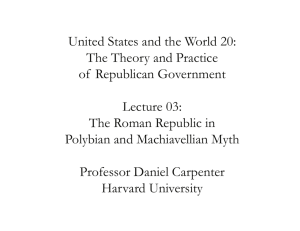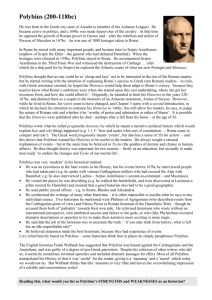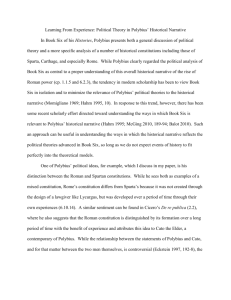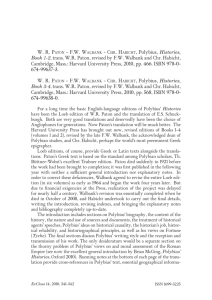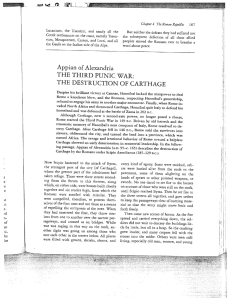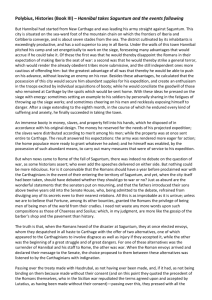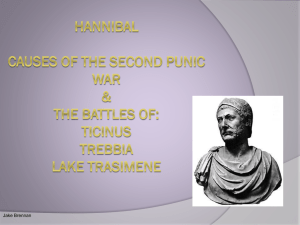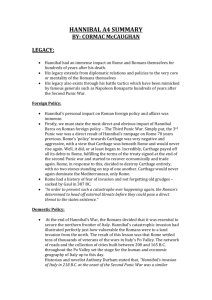Elements of Bias in Polybius' Treatment of the First and Second
advertisement
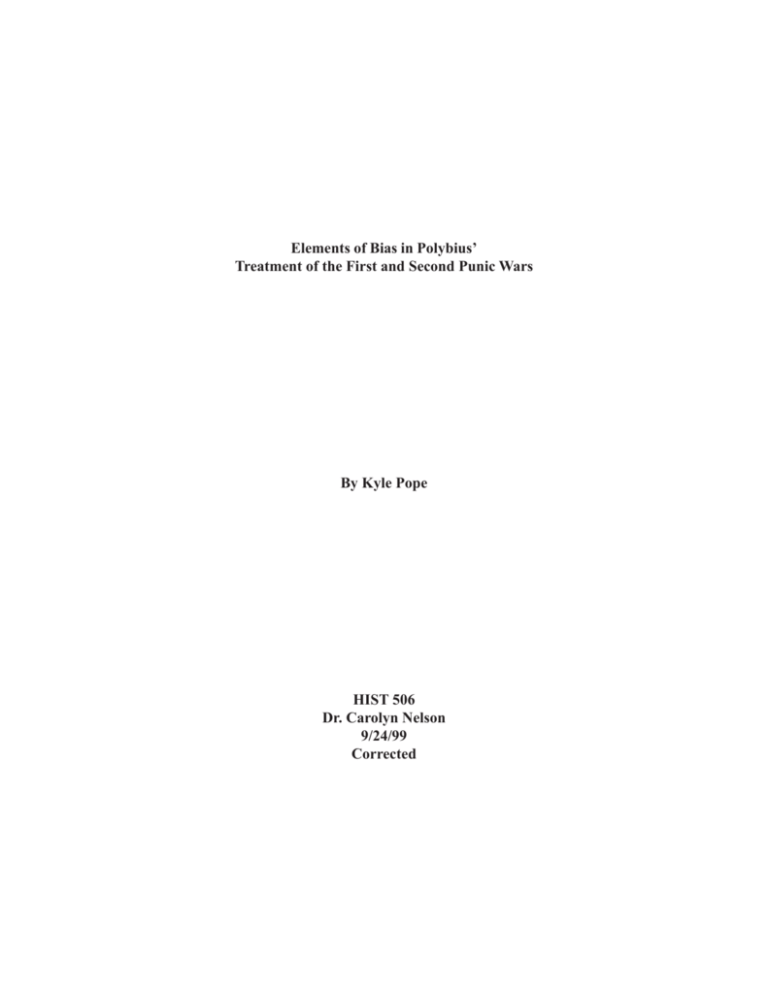
Elements of Bias in Polybius’ Treatment of the First and Second Punic Wars By Kyle Pope HIST 506 Dr. Carolyn Nelson 9/24/99 Corrected ÚpqloÖ^ cfilplcÖ^ pq◊k h m^o^abfuj‡qsk History is philosophy from examples — Dionysius of Halicarnassus, Ars Rhetorica. 11.2 Identifying bias in the work of any historical writer is not an easy task given the fact that time often hides from us ethnic, political, social, and religious inclinations which might have been glaringly apparent to an author’s contemporaries. The Greek historian Polybius1 in his Histories sets a very high standard for himself in his discussion of the first and second Punic wars. While he contends that “a good man ought to love his friends and his country, and should share (prjjfpbØk1 ) both their hatreds and their loyalties,” he declares that the man who would “take up the role of the historian (qí q«t ÚpqloÖ^t ≤vlt2 )” must “discard all considerations of this kind” (1.14). While this goal of impartiality is admirable, and perhaps more perfectly attained by Polybius than most other ancient historical writers, in at least three areas his own bias can be readily identified: 1.) in his views regarding the purpose of historical writings, 2.) in his appraisal of Hamilcar and Hannibal, and 3.) in his attitudes towards the role of the supernatural in history. The Purpose of Historical Inquiry In spite of the high standard of impartiality that Polybius sets for himself, he advocates a purpose which does not aim towards pure objectivity. Polybius repeatedly asserts that a written historical work must offer “instruction for the future” (3.57). To accomplish this he suggests that both the writer and reader of history must not “confine their attention to the narrative of events but must take account of what preceded, accompanied and followed them” (3.31). While we would agree that an understanding of the context is essential to a full analysis of the significance of an event, for Polybius this means something more. He suggests: …if we remove from history the analysis of why, how and for what purpose each thing was done and whether the result was what we should reasonably have expected, what is left is a mere display of descriptive virtuosity, but not a lesson (j‡vej^), and this, though it may please for the moment, is of no enduring value for the future (ibid.). 1 All English quotes are from Polybius: The Rise of the Roman Empire trans. by Ian Scott-Kilvert (Penguin Books: New York, 1979). 1 prjjfp•s , “join with in hating” (LSJ, p. 1679). 2 ÚpqloÖ^ - “inquiry…II. written account of one’s inquiries, history” (LSJ, p. 842). ≤vlt - “…II. custom, usage…2. disposition, character” (LSJ, p. 766). Pope, p. 3 For Polybius, the “enduring value” of history is the “lesson” (j‡vej^) which it provides for the future. This j‡vej^ in the Greek is defined as “that which is learnt, lesson” (LSJ, p.1072). The question is can a historian extract a “lesson” from history while maintaining impartiality? For Polybius this involves more than “the mere statement of fact” (12.25b). He asserts that, for history to be “fruitful” (¢dh^omlt3 ) it must “draw analogies between parallel circumstances” of the past and present to forecast future events and to take precautions so as to avoid recurrences (ibid.). It is in drawing these “lessons” that Polybius crosses the line of partiality and betrays a predisposed system of values, through which he interprets the events that he describes. Let us consider a major example of this. An important issue to Polybius with respect to the second Punic war concerned what he distinguished as the “beginnings” (Šouˆt4) as opposed to the “causes” (^ÙqÖ^t5 ) of the conflict. Polybius defines the former as “the first attempt to execute and put into action plans that have already been decided” and the latter as “those events which influence in advance our purposes and decisions, that is to say our conceptions of things, our state of mind, our calculations about them and the whole process of reasoning whereby we arrive at decisions and undertakings” (3.6). Polybius differs with other writers who say the “causes” of the second war were 1.) Hannibal’s siege of Saguntum and 2.) his crossing of the Ebro, and classifies these instead as the “beginnings” of the conflict. Instead, Polybius goes to great lengths to argue carefully that the real “causes” of the conflict were 1.) the anger of Hamilcar Barca (3.9), and 2.) the expulsion of the Carthaginians from Sardinia (3.10).7 In this very argumentation Polybius betrays a certain moral predisposition in his analysis of the events. He is addressing issues of blame and responsibility, as well as right and wrong. For example in sections twenty-two through twenty-five of book three, Polybius reviews three treaties which had been made between Rome and Carthage prior to the first war, which were “preserved on bronze tablets” in his own day in the treasury of the Aediles beside the temple of Jupiter Capitolinus (3.26). In Polybius’ view these treaties in no way prohibited the Romans from crossing into Sicily to assist the Mamertines (3.28). So with respect to the first “cause” which Polybius offers, he does 3 ¢dh^omlt - “containing fruit, produce, fruitful” (LSJ, p. 470). Šou© - “beginning, origin, source, … 2. first principle” (LSJ, p. 252). 5 ^ÙqÖ^ - “responsibility, guilt, blame… II. cause, … III. occasion, motive” (LSJ, p.44). 7 Apparently not all after him would accept Polybius’ distinctions between “beginnings” and “causes.” Cicero wrote “The siege of Saguntum was the cause of the second Punic war, which Hannibal carried on against our ancestors.” Philippics (5.27). 4 Pope, p. 4 not shy away from justifying the Roman position in the first war which he calls a “war for the possession of Sicily” (3.25). With little explanation, he accepts the Roman view that if Carthage was allowed to take all of Sicily, “they would prove the most vexatious and dangerous (iÖ^k _^obØt h^◊ cl_bol◊7) of neighbors, since they would encircle Italy on every side and threaten every part of the country” (1.10). In spite of the fact that Hamilcar Barca died ten years before the second war, as the historian himself points out (3.10), Polybius places the blame on Hamilcar by describing the boyhood oath he made his son Hannibal take “that he would never become a friend to the Romans9 ” (3.11). With respect to his second “cause” Polybius reveals his moral predisposition regarding the seizure of Sardinia. He speaks of it as an “injustice” (3.10), something by which the Carthaginians were “further provoked” (3.13). Polybius even suggests a “better” course that Hannibal should have taken. In speaking of Hannibal’s defense of his seizure of Saguntum, Polybius inserts himself into the narrative declaring: How much better it would have been if he had demanded that the Romans should hand back Sardinia, and at the same time remit the indemnity which they had unjustly extorted (m^oÐ ^äqÂk ¢i^_lk0/) when they took advantage of Carthage’s misfortunes to threaten her with war if their ultimatum was rejected (3.15). Later in the same book, after his discussion of the three pre-war treaties, Polybius states, regarding Sardinia: “it is impossible to discover any reasonable ground or pretext (^ÙqÖ^k) for the Romans’ action” (3.28). While it could be argued that Polybius is simply concerned with the legality of either action based on the written demands of the treaties, one is still left with the fact that Polybius felt the Romans in one instance were justified in expelling the Carthaginians from Sicily but not from Sardinia. Did Polybius feel that Carthaginian control of Sardinia posed less of a threat than it did in Sicily? Did Polybius have some sense of moral fairness, that would demand both sides retain some possession? Whatever the case, it is clear that Polybius brings to the discussion some set of moral values through which he interprets the events in question. 7 iÖ^k - “very, exceedingly” (LSJ, p. 1046). _^oát - “heavy in weight, burdensome, grievous, oppressive” (LSJ, p. 308). cl_boìt - “fearful, I. causing fear, terrible, formidable…” (LSJ, p. 1946). 9 Livy claims he swore - “as soon as he possibly could he would show himself the enemy of Rome” adactum se cum primum posset hostem fore populo Romano. (Ab Urbe Condita, 21.1). 0/ Literally - “they took from them.” Pope, p. 5 Hamilcar and Hannibal In advocating an approach that disregards personal partiality Polybius suggests that it will demand that the historian… …will often have to speak well of his enemies and even award them the highest praise should their actions demand this, and on the other hand criticize and find fault with his friends, however close they may be, if their errors of conduct show that this is his duty (1.14). At times Polybius carries this to a level that seems to move beyond objectivity to the point of adoration. First regarding Hamilcar Barca, and the first war, he writes: “In respect of individual courage the Romans were far superior, but the general who must be acknowledged as the greatest (Œofpqlk00) on either side, both in daring and in genius, was Hamilcar, surnamed Barca.” (1.64). When forced to end the first war, to Polybius, Hamilcar continues to be a “good and prudent commander” (1.62). The historian declares of him : “If ever there was a general who tested every prospect of victory to the full, it was he” (ibid.). In contrast to this we can compare the rather matter of fact way that years later Livy, in the Ab Urbe Condita, would speak of him casually as “the great Hamilcar” (24.41). Polybius’ treatment of Hannibal is no less laudatory. He himself declares his “admiration” ( mfpej©k^fql01 ) for Hannibal’s leadership, courage, and ability in the field” (11.19). Polybius even takes the position of Hannibal’s apologist on at least two occasions. The first is in response to the charge of the historian Fabius, that Hannibal had acted without the authority of the Carthaginian senate in initiating the second war. Polybius suggests that the perfect occasion for this to manifest itself, if it were true, would have been when the Roman envoys demanded his surrender (3.8) Later, near the end of his discussion of the second Punic war, he defends Hannibal against charges of cruelty and greed (9.22). The charge of cruelty, which seems to have been a Roman accusation (9.26) he dismisses with examples of harsh Greek rulers (9.23) and the argument that the circumstances demanded it (9.24). With regard to the accusation of greed, which was in turn a Carthaginian charge (9.26), Polybius blames this impression on the greed of Hannibal’s friends (9.25). If in any respect Hannibal deserved blame, Polybius claims the suggestions of his friends “did violence to Hannibal’s natural character” (9.26). This stands in marked contrast to both 00 01 Œofpqlt - “best, noblest, bravest” (LSJ, p. 241). mfpej^Öks - “seal, to have a mark set on one… generally applaud, signify approval” (LSJ, p. 655). Pope, p. 6 the manner that other writers speak of Hannibal, and the manner in which he and other writers will speak of men like Scipio Africanus and Fabius “the delayer.” Cicero will use the name of Hannibal as a standard metaphor for Roman danger, and Horace in his Odes will describe him as “treacherous Hannibal13 ” (4.4.49). Regarding Scipio and Fabius Polybius’ praise is rather reserved (3.89; 10.2,3), whereas Livy would say of Fabius “In Italy the masterly inaction of Fabius had for a short time stemmed the tide of Roman disasters.” (Ab Urbe Condita, 22.23) and Cicero would say of Scipio “Let Scipio be thought illustrious, he by whose wisdom and valour Hannibal was compelled to return into Africa, and to depart from Italy” (Against Catiline 4.21). Impartiality does not demand indifference, but when a clear preference is demonstrated it shows us that the writer is not giving simply a dispassionate appraisal of character. The Supernatural in Historical Inquiry Finally, Polybius assumes a rather confusing position toward supernatural intervention in human affairs. When discussing Hannibal’s crossing the Alps he mocks other historians whom he describes as “false and inconsistent” when they attribute events to the gods and sons of gods in what is supposed to be a “factual history” (mo^dj^qfhªk ÚpqloÖ^k03 , 3.47). He likens it to dramatists who need a “deus ex machina”(vblã h^◊ jeu^k«t) to resolve their plots. He views it as putting a “rational ending on an irrational beginning” (3.48). And yet when discussing the events of the first Punic War he declares “Fortune (≠ qáue04), like a good umpire (_o^_brqªt05) in the games suddenly brought about an unexpected change in the contest” (1.58). He speaks of Fortune as having steered “almost all the affairs of the world” (1.4). These are more than simply isolated occurrences. A computer word search reveals the word qáue is used in Polybius’ Histories one-hundred and nineteen times, with twenty-five of these instances found in the nominative case, positioning qáue as the clear subject of the action. In his praise of Hamilcar Barca, Polybius claims that the outcome of the first war was not “by chance” (qáuõ - 1.63). In his assessment of the character of Hannibal, the historian writes: … all this he achieved under conditions which were by no means consistent but 13 perfidus Hannibal. mo^dj^qfh© , “fit for action or business, businesslike, statesmanlike …deliberation on matter of fact or action” (LSJ, p. 1458). 04 qáue , “the act of a god, b. the act of a human being, 2. Necessity, Fate, II. regarded as an agent or cause beyond human control: 1. fortune, providence, fate, 2. chance” (LSJ, p.1839). 05 _o^_brqªt , “judge at the games, arbiter, umpire” (LSJ, p.327). 03 Pope, p. 7 perpetually changing, with the gale of fortune (qáuet) often blowing in his favor, but also at times in the opposite direction (11.19). Before Hasdrubal (Hannibal’s brother) makes his fateful march into Italy, Fortune is spoken of as being able to give him victory (10.37). In Hannibal’s speech to Scipio, he warns him of the “ebb-tide of Fortune” (qáuet - 15.7). It is unclear whether Polybius is simply using metaphorical language, or if he personifies and deifies Fortune, as was common in these times. In Polybius’ description of the character of Scipio he somewhat explains his position on Fortune, but what remains offers little to resolve this inconsistency. He suggests that many writers portray Scipio as “favored by Fortune” and feel that people who are so favored, are more “godlike” than those who act by “rational calculation.” Polybius then suggests that being favored by Fortune is actually less praiseworthy than to achieve things by “sound judgment and mental ability.” Those who succeed by the latter, he suggests are the ones whom men should “regard as most godlike and most beloved by the gods” (10.2). Is Polybius suggesting then that rational skills are divinely given? Why is this not putting “a rational ending on an irrational beginning?” How can he attribute to Fortune the steering of human affairs and yet criticize those who bring in gods and sons of gods? All of this demonstrates at the least a logical inconsistency, and at the worst a bias which allows his own concepts of deity, while rejecting that of others. Conclusion. The entire question of bias, may in fact be more of a twentieth century issue than a second century B.C. problem. When Polybius advocates an impartial appraisal of both friends and enemies, he never suggests that he, himself is completely removed from the analysis. This is evident because of the fact that the goal he seeks to attain is the discerning of a “lesson (j‡vej^).” It is only when events or personalities are interpreted through the author’s system of moral and ethical values that a “lesson (j‡vej^)” can be drawn. It is our generation that imagines that a human being can distance himself so far from the historical events which he discusses that pure objectivity can be attained. For Polybius no such impersonal standard was attempted.
